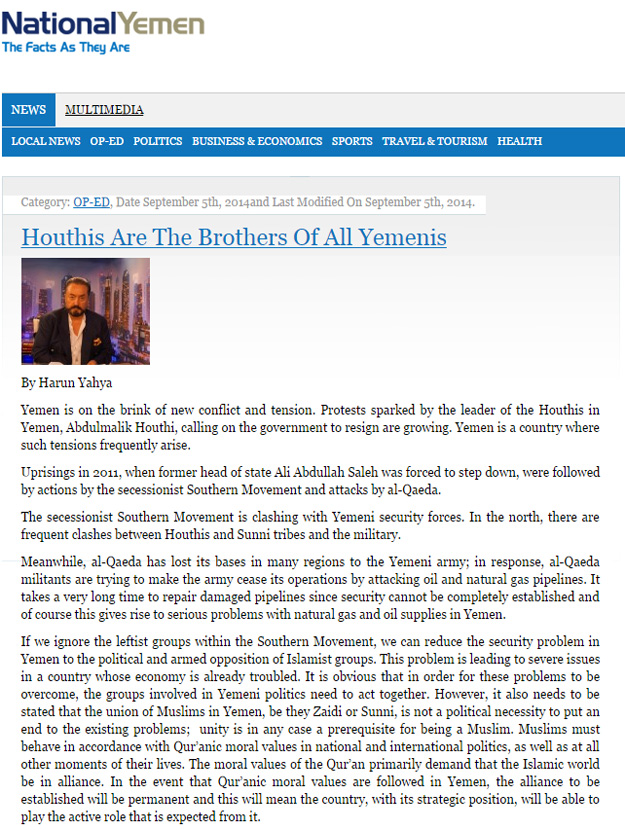
Yemen is on the brink of new conflict and tension. Protests sparked by the leader of the Houthis in Yemen, Abdulmalik Houthi, calling on the government to resign are growing. Yemen is a country where such tensions frequently arise.
Uprisings in 2011, when former head of state Ali Abdullah Saleh was forced to step down, were followed by actions by the secessionist Southern Movement and attacks by al-Qaeda.
The secessionist Southern Movement is clashing with Yemeni security forces. In the north, there are frequent clashes between Houthis and Sunni tribes and the military.
Meanwhile, al-Qaeda has lost its bases in many regions to the Yemeni army; in response, al-Qaeda militants are trying to make the army cease its operations by attacking oil and natural gas pipelines. It takes a very long time to repair damaged pipelines since security cannot be completely established and of course this gives rise to serious problems with natural gas and oil supplies in Yemen.
If we ignore the leftist groups within the Southern Movement, we can reduce the security problem in Yemen to the political and armed opposition of Islamist groups. This problem is leading to severe issues in a country whose economy is already troubled. It is obvious that in order for these problems to be overcome, the groups involved in Yemeni politics need to act together. However, it also needs to be stated that the union of Muslims in Yemen, be they Zaidi or Sunni, is not a political necessity to put an end to the existing problems; unity is in any case a prerequisite for being a Muslim. Muslims must behave in accordance with Qur’anic moral values in national and international politics, as well as at all other moments of their lives. The moral values of the Qur’an primarily demand that the Islamic world be in alliance. In the event that Qur’anic moral values are followed in Yemen, the alliance to be established will be permanent and this will mean the country, with its strategic position, will be able to play the active role that is expected from it.
Islamic moral values require that Muslims always behave in a unifying manner and be brothers in faith in a spirit of solidarity and mutual aid. Allah commands Muslims not to quarrel among themselves (Surat al-Anfal, 46) and reveals that such behavior will only weaken them.
A Muslim who acts in the light of good conscience and reason, and who thinks more of justice than his own interests, can never fail to be allied with other Muslims and musn’t be in a state of constant dispute with them. Explaining this to the Houthis in a sincere manner, and using the appropriate means, can represent a good start to a solution.
Allah forbids Muslim communities to be unjust or hostile toward one another. The Qur’an reveals that any such behavior must be stopped and that peace must be made between the quarelling Muslim communities.
Of course there may be various regional, cultural and traditional differences of practice and understanding among all Muslim communities. There will even be different interpretations, views and sects, such as in the case of Zaidi and Sunni sects; that is perfectly natural. What there must not be, however, is for one group to line up against another, like in Yemen, because of such differences, and cease all dialogue with them, regard them as foreign and even enemies as if they are people with whom there can be no agreement on the basis of common values. That is wholly unacceptable.
Allah warns Muslims against falling into such an error in the Qur’an, and points to the errors made by Christians and Jews on the subject as a deterrent. In reporting the errors made by Christians and Jews, we are also told that these communities fall out among themselves: Verse 4 of Surat al-Bayyina says that the People of the Book divided into sects even though a ‘Clear Sign’ came to them. Other verses point to poor moral values such as “injustice,” “envy” and “rebellion against the Lord” as the reasons for such division.
It is the fact that people do not abide by the moral values commanded by Allah that lies behind religious divisions. These moral values are based on humility. People who abandon humility regard themselves and their own ideas as absolutely in the right, despise those who disagree with them and feel hostility toward them. Since they have no doubts at all about the correctness of their ideas, they never question themselves and thus make any progress or improvement. The position of those who take great pride in their own ideas is described as follows in the Qur’an; “… But they disagreed and split up, dividing into sects, each party exulting in what it had.” (Surat al-Mu’minun, 53).
What needs to happen is for different Muslim communities to be careful not to fall out over possible cultural and traditional differences, nor prepare the foundations of conflict by constantly emphasizing these differences, but to support an alliance based on living by the moral values of the Qur’an. Muslims must support one another in alliance, must be tolerant on those areas in which they disagree, and must behave in an understanding manner. In particular, leading thinkers and people of ideas in the Islamic world who realize the danger must engage in intense activities and encourage union and unity among Muslims. A solidarity built upon love, respect, compassion and tolerance must be built, not only in Yemen, but in the entire Muslim world.
What lies at the heart of Islamic moral values is not dispute and division, but a concept based on unity of belief and shared values. The duty of all Yemenis, Zaidi or Sunni, is to adopt and implement that understanding.
Adnan Oktar's piece on National Yemen:
http://nationalyemen.com/2014/09/05/houthis-are-the-brothers-of-all-yemenis/


